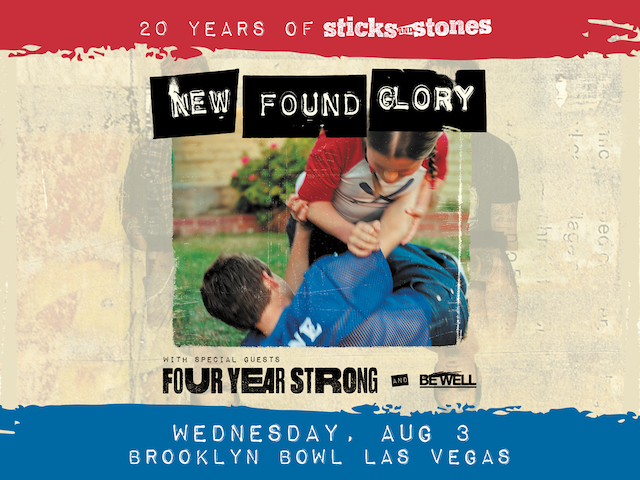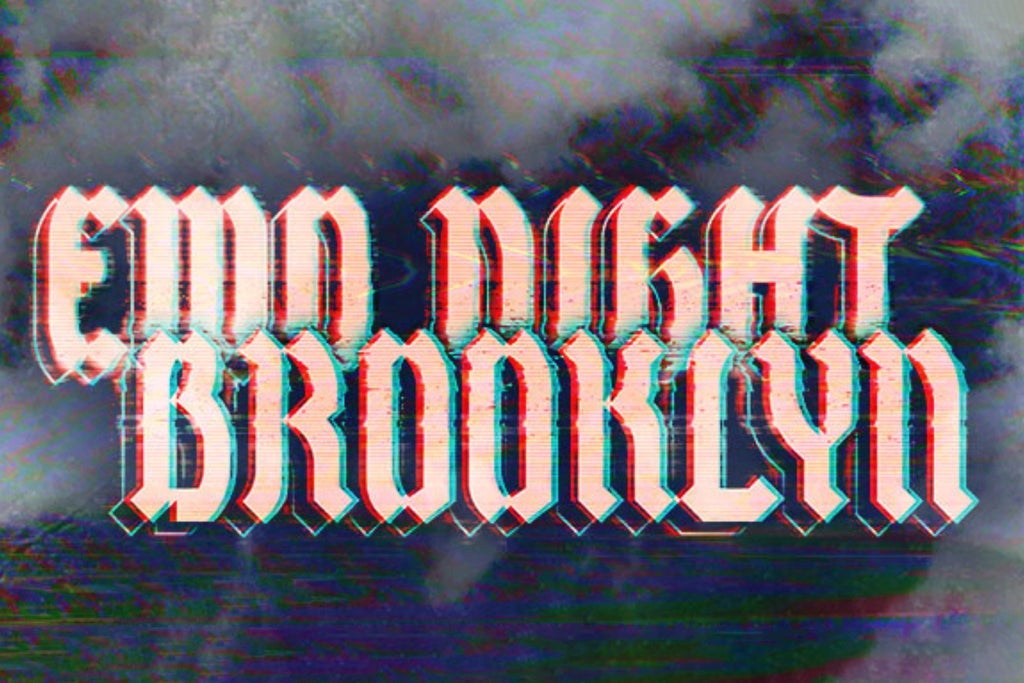New Found Glory 2022 Sticks & Stones 20th Anniversary Tour
Four Year Strong - Be Well

Event Info
Brooklyn Bowl Las Vegas
The Linq Promenade
Las Vegas, NV
$29.99 General Admission
$35.00 General Admission (Day of Show)
$45.00 Club Level General Admission
BBLV Presale: Wednesday, February 17th @ 9am PST
Public Onsale: Thursday, February 18th @ 9am PST
**Tickets for this event will be delivered to your email 7 days prior to the show**
Based on the latest local guidelines, attendees are no longer required to provide proof of negative COVID-19 test AND/OR vaccination for entry into this event. Brooklyn Bowl encourages mask wearing and encourages you to get vaccinated if you aren’t already! Be sure to check our venue website for the latest updates and guidelines as entry requirements are subject to change.
An inherent risk of exposure to COVID-19 exists in any public place where people are present. COVID-19 is an extremely contagious disease that can lead to severe illness and death. According to the local health authorities, senior citizens and guests with underlying medical conditions are especially vulnerable. By visiting our establishment, you voluntarily assume all risks related to the exposure to or spreading of COVID-19.
All support acts are subject to change without notice.
All guests must have a valid government/state issued ID for entry to the venue. No refunds.
Tickets purchased in person, subject to $2.00 processing charge (in addition to cc fee, if applicable).
All general admission tickets are standing room only.
ALL TICKET PRICES INCLUDE NEVADA'S 9% LIVE ENTERTAINMENT TAX
*Advertised times are for doors -- show time not available*
Artist Info
New Found Glory

As New Found Glory can attest, life moves quickly. Just three years after forming in Coral Springs, Florida, in 1997, the group were fast-tracked from local upstarts to mainstream stars on the back of ebullient pop melodies and hardcore-tinged breakdowns, setting off a blast of pop-punk dynamite that still lights the torch for modern acts more than two decades later. They became the voice of an underground movement, spurring iconic gold and platinum records (2000’s New Found Glory, 2002’s Sticks & Stones, and 2004’s Catalyst), countless MTV appearances, an entire subgenre (easycore) and sold-out tours the world over. New Found Glory has always been about the same thing - honesty, community, and positivity. After 25+ years of being a band, 11 studio albums, one live album, one Christmas album, one acoustic album, two EPs, and four cover albums, New Found Glory’s ethos has never wavered; they always strive to be the friend you always need and always understands you.
Four Year Strong

If it’s hard for you to believe that Four Year Strong have been a band for nearly two decades, you’re not alone because its members feel the same way. Since forming in 2001 in Worcester, Massachusettes, while the members were still in high school, Four Year Strong have carved out their own niche in the music community by merging the infectiousness of pop-punk with the aggression of hardcore and never shying away from breaking with creativity-limiting conventions. This is evident on the band’s fifth full-length Brain Pain, a collection of songs that retains the qualities of the band that fans have grown to love while pushing forward the band’s effort to continually redefine their sound. “One thing we’ve struggled with in the past is writing in a way that’s personal to us that our wide range of fans can find a way to relate to as well,” vocalist/guitarist Dan O’Connor explains. “On this record we really tried to find the thing that connects us to our younger fans or the people who have been listening to us for a long time who still see us as younger kids despite the fact that we’re now in our thirties.”
The band -- which also features vocalist/guitarist Alan Day, bassist Joe Weiss and drummer Jake Massucco -- began conceptualizing the ideas for Brain Pain two years ago and for the past year-and-a-half have focused on bringing those thoughts to fruition. “We probably had 40 song ideas to get the creative juices flowing and some of those grew into the songs that are on this record,” Day explains, adding that it was important for the group not to rush the album or go into it with any musical or logistical limitations. “We didn’t want to set a strict deadline for this album because we wanted to be sure we took the time to write the best songs possible. In the past our writing and recording was so dependent on getting something out in time to go on tour; this time we really had the opportunity to take our time and work through these ideas.” In order to capture that sound the group enlisted producer Will Putney, who was an engineer on 2010’s Enemy Of The World and already had a relationship with the band. “We were really emotionally invested in this music so we wanted to go with someone who we knew would care about it as much as we did and Will was that guy,” Day says.
From the off-time breakdown of the opener “It’s Cool” to the orchestral balladry of “Be Good When I’m Gone” to the midtempo groove of “Get Out Of My Head,” Brain Pain sees Four Year Strong showcasing the various aspects of their sound, which ranges from catchy to chaotic, yet all sound undeniably like Four Year Strong. “I think ‘Get Out Of My Head’ holds a special place in our hearts because it was the first song that we finished front-to-back with all the pieces in there,” Day explains. “Almost none of it changed from when we first wrote it to the finished version of it and it felt like a turning point in the writing process.” Alternately “Seventeen” evokes the best parts of nostalgia without sounding dated while the syncopated riffing on “Usefully Useless” crafts a sonic maelstrom that’s as inventive as it is infectious. Finally old-school fans will love songs like “Mouth Full Of Dirt” which showcases the melodic hardcore style the band helped pioneer and sounds absolutely massive thanks to Putney’s production.
Vocally Brain Pain sees the band being more direct and carrying over cohesive themes in a way they haven’t done in the past, making for a more complete narrative. “I think that from a lyrical perspective this is the most thought we’ve ever put into a record,” O’ Connor explains -- and it shows. Sonically the album’s vocals also sit in the mix in a way that they aren’t battling with the other elements, making Brain Pain the band’s most dynamic release to date. “There are a lot more bands doing the heavy-but-poppy hybrid thing now than there were when we started out and we just really wanted this record to stand out and be its own version of that,” Massucco explains. “Our goal was to make a record that felt authentic to who we are, not pander to some version of us that we thought people wanted to hear,” Day affirms. “I think we did that this time around.”
“We always try to evolve the sound of our band,” O’Connor adds. “I think that's one of the things that has separated us from some of the bands who are around for a long time because you can get kind of sendenary and happy with where you are. We always say, ‘if Four Year Strong is a box we're always trying to push the edges of that box out a little bit of what the band can be’ and I think that's keeps it exciting for us,” he summarizes when asked about how the band have managed to stay relevant for so long. “A lot of the things we did when we were younger kids were throwing things against the wall and seeing what sticks. Now we're trying to come to a place with everything we're doing where it's a little more thought out… which is what old guys would do,” he adds with a laugh, “but we’re really happy with how it turned out.”

